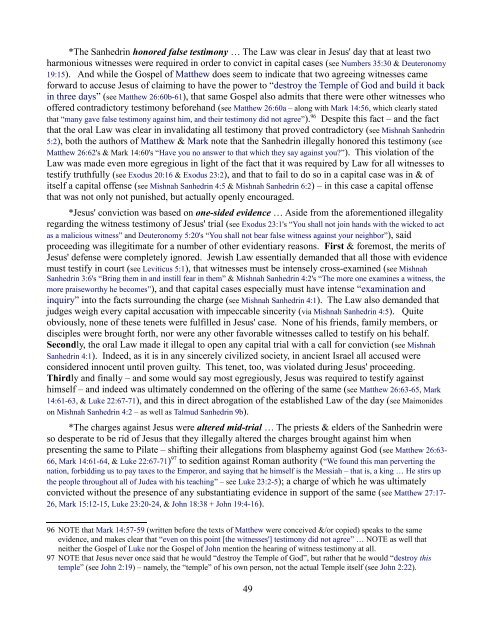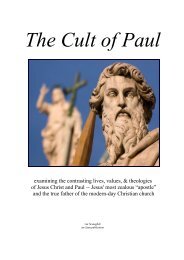Jesus Christ - a most Holy Heretic
An illuminating (and biblically exhaustive) examination of the little-known truth that Jesus Christ was not so much a supporter of the Old Testament laws of his day as he was a radically thorough reformer thereof
An illuminating (and biblically exhaustive) examination of the little-known truth that Jesus Christ was not so much a supporter of the Old Testament laws of his day as he was a radically thorough reformer thereof
You also want an ePaper? Increase the reach of your titles
YUMPU automatically turns print PDFs into web optimized ePapers that Google loves.
*The Sanhedrin honored false testimony … The Law was clear in <strong>Jesus</strong>' day that at least two<br />
harmonious witnesses were required in order to convict in capital cases (see Numbers 35:30 & Deuteronomy<br />
19:15). And while the Gospel of Matthew does seem to indicate that two agreeing witnesses came<br />
forward to accuse <strong>Jesus</strong> of claiming to have the power to “destroy the Temple of God and build it back<br />
in three days” (see Matthew 26:60b-61), that same Gospel also admits that there were other witnesses who<br />
offered contradictory testimony beforehand (see Matthew 26:60a – along with Mark 14:56, which clearly stated<br />
that “many gave false testimony against him, and their testimony did not agree”). 96 Despite this fact – and the fact<br />
that the oral Law was clear in invalidating all testimony that proved contradictory (see Mishnah Sanhedrin<br />
5:2), both the authors of Matthew & Mark note that the Sanhedrin illegally honored this testimony (see<br />
Matthew 26:62's & Mark 14:60's “Have you no answer to that which they say against you?”). This violation of the<br />
Law was made even more egregious in light of the fact that it was required by Law for all witnesses to<br />
testify truthfully (see Exodus 20:16 & Exodus 23:2), and that to fail to do so in a capital case was in & of<br />
itself a capital offense (see Mishnah Sanhedrin 4:5 & Mishnah Sanhedrin 6:2) – in this case a capital offense<br />
that was not only not punished, but actually openly encouraged.<br />
.<br />
*<strong>Jesus</strong>' conviction was based on one-sided evidence … Aside from the aforementioned illegality<br />
regarding the witness testimony of <strong>Jesus</strong>' trial (see Exodus 23:1's “You shall not join hands with the wicked to act<br />
as a malicious witness” and Deuteronomy 5:20's “You shall not bear false witness against your neighbor”), said<br />
proceeding was illegitimate for a number of other evidentiary reasons. First & fore<strong>most</strong>, the merits of<br />
<strong>Jesus</strong>' defense were completely ignored. Jewish Law essentially demanded that all those with evidence<br />
must testify in court (see Leviticus 5:1), that witnesses must be intensely cross-examined (see Mishnah<br />
Sanhedrin 3:6's “Bring them in and instill fear in them” & Mishnah Sanhedrin 4:2's “The more one examines a witness, the<br />
more praiseworthy he becomes”), and that capital cases especially must have intense “examination and<br />
inquiry” into the facts surrounding the charge (see Mishnah Sanhedrin 4:1). The Law also demanded that<br />
judges weigh every capital accusation with impeccable sincerity (via Mishnah Sanhedrin 4:5). Quite<br />
obviously, none of these tenets were fulfilled in <strong>Jesus</strong>' case. None of his friends, family members, or<br />
disciples were brought forth, nor were any other favorable witnesses called to testify on his behalf.<br />
Secondly, the oral Law made it illegal to open any capital trial with a call for conviction (see Mishnah<br />
Sanhedrin 4:1). Indeed, as it is in any sincerely civilized society, in ancient Israel all accused were<br />
considered innocent until proven guilty. This tenet, too, was violated during <strong>Jesus</strong>' proceeding.<br />
Thirdly and finally – and some would say <strong>most</strong> egregiously, <strong>Jesus</strong> was required to testify against<br />
himself – and indeed was ultimately condemned on the offering of the same (see Matthew 26:63-65, Mark<br />
14:61-63, & Luke 22:67-71), and this in direct abrogation of the established Law of the day (see Maimonides<br />
on Mishnah Sanhedrin 4:2 – as well as Talmud Sanhedrin 9b).<br />
.<br />
*The charges against <strong>Jesus</strong> were altered mid-trial … The priests & elders of the Sanhedrin were<br />
so desperate to be rid of <strong>Jesus</strong> that they illegally altered the charges brought against him when<br />
presenting the same to Pilate – shifting their allegations from blasphemy against God (see Matthew 26:63-<br />
66, Mark 14:61-64, & Luke 22:67-71) 97 to sedition against Roman authority (“We found this man perverting the<br />
nation, forbidding us to pay taxes to the Emperor, and saying that he himself is the Messiah – that is, a king … He stirs up<br />
the people throughout all of Judea with his teaching” – see Luke 23:2-5); a charge of which he was ultimately<br />
convicted without the presence of any substantiating evidence in support of the same (see Matthew 27:17-<br />
26, Mark 15:12-15, Luke 23:20-24, & John 18:38 + John 19:4-16).<br />
.<br />
96 NOTE that Mark 14:57-59 (written before the texts of Matthew were conceived &/or copied) speaks to the same<br />
evidence, and makes clear that “even on this point [the witnesses'] testimony did not agree” … NOTE as well that<br />
neither the Gospel of Luke nor the Gospel of John mention the hearing of witness testimony at all.<br />
97 NOTE that <strong>Jesus</strong> never once said that he would “destroy the Temple of God”, but rather that he would “destroy this<br />
temple” (see John 2:19) – namely, the “temple” of his own person, not the actual Temple itself (see John 2:22).<br />
49

















